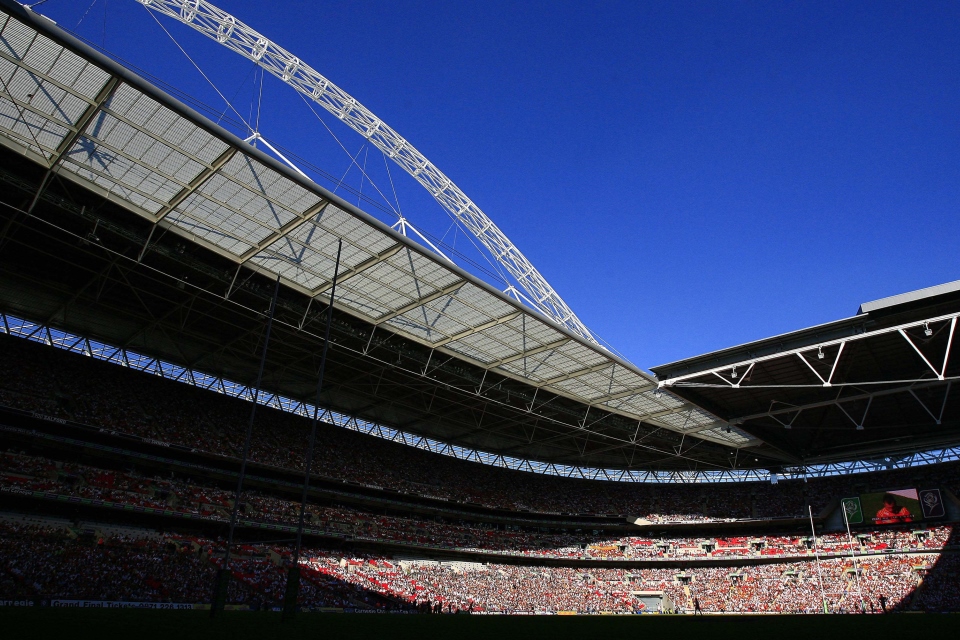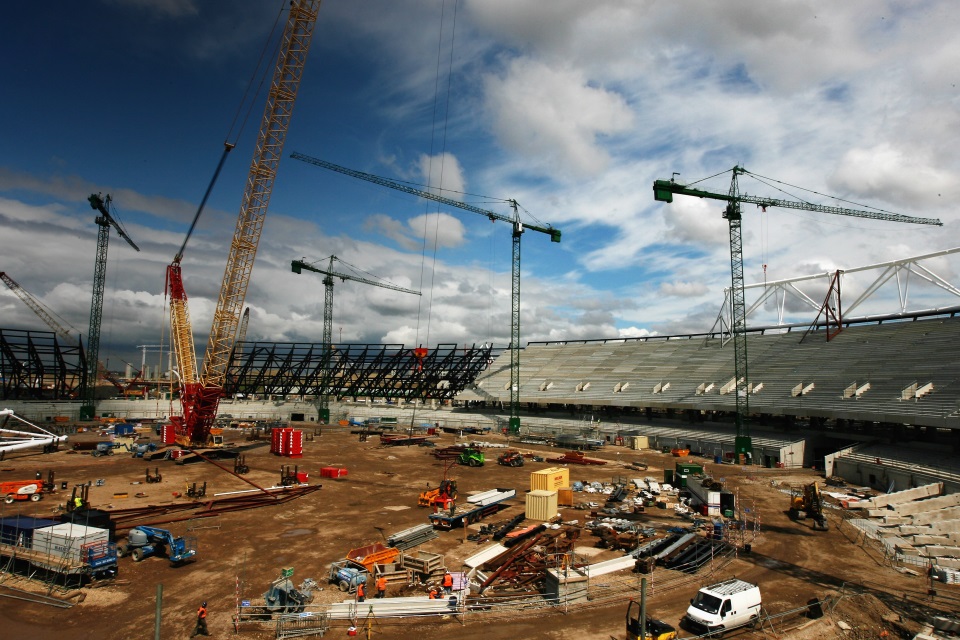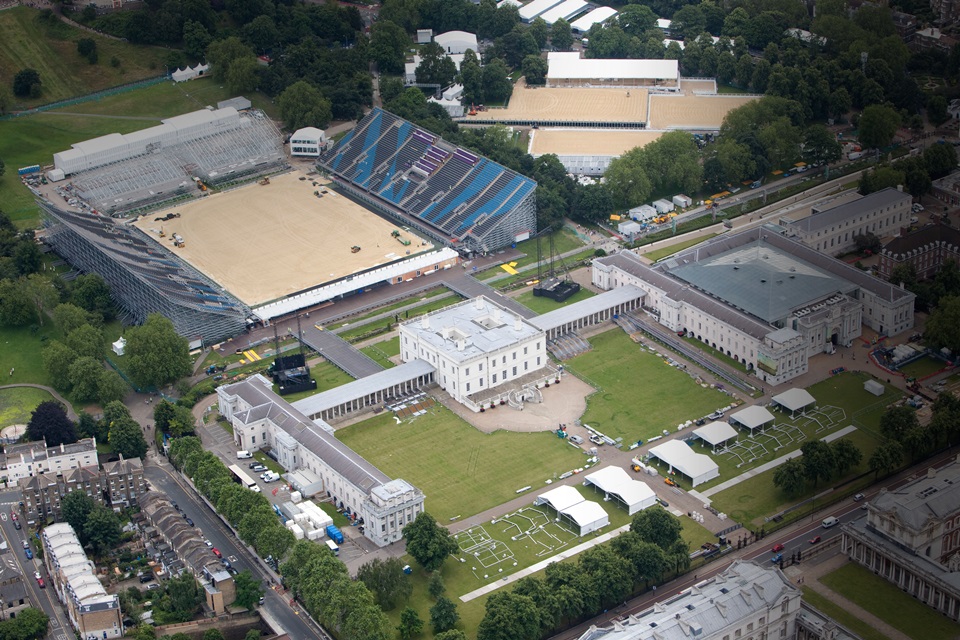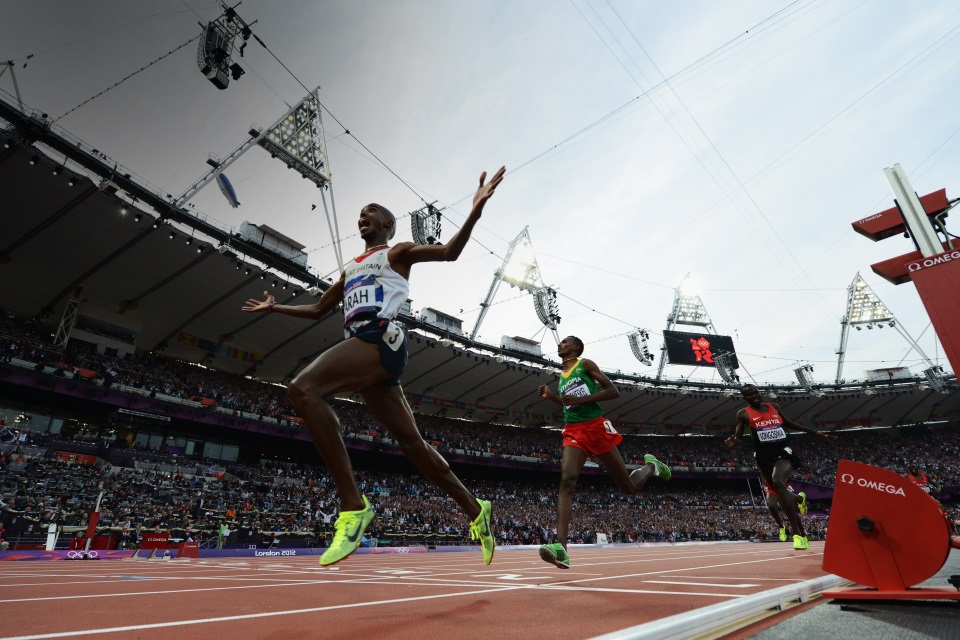Sporting excellence: Delivering world class events
Published 17 February 2016
UK global sports projects expertise: Leading the way
Built on a long heritage of sporting participation, the UK has developed an enviable worldwide reputation for organising first-class sporting events.
This reached a pinnacle with the successful delivery of both the London 2012 Olympic and Paralympic Games and the Glasgow 2014 Commonwealth Games - hailed as ‘the standout Games in the history of the movement’ by then Commonwealth Games Federation Chief Executive Mike Hooper.

London 2012 Olympic Stadium (c) ODA 2008
But it is not just with sporting events held in the country that UK companies have demonstrated their experience and expertise. They have played a leading role in the delivery of the highest profile global scale events since the 2000 Sydney Olympics.
As well as Olympic and Paralympic Games, both Summer and Winter, UK expertise and capability has supported the delivery of Commonwealth Games, FIFA World Cup, Formula 1 Grand Prix and a host of other sporting and non-sporting events across the world. UK consultants provide expertise at every stage of bidding for and hosting a major sports event, including:
- feasibility studies and construction
- securing and delivering events
- long-term usage of venues

Wembley football stadium (c) Punchstock
UK commercial expertise has helped make the English Premier League one of the most closely followed sporting tournaments in the world and with the highest revenue of any football league in the world.
£20 billion: Sports estimated annual worth to the UK economy
Expertise across the board
- concept and bidding
- planning and design
- construction and fitout
- event delivery
- legacy
Concept and bidding
With experience of working with the world’s leading cities and high-profile events, UK companies combine in depth knowledge of bid management with a unique understanding of event owners’ requirements.
All bidding cities have their own motives and national vision intrinsically linked to their desire to host a major sports event. Many look to the UK to help communicate that vision to the likes of the International Olympic Committee (IOC), FIFA, Commonwealth Games Federation (CGF) and the watching world.

Olympic bidding (c) Alamy
UK companies have managed strategic communications and helped tell the winning story for Beijing, London, Sochi, Rio de Janeiro, Tokyo, Pyeongchang and Doha, helping them to fulfill their dreams of making the step from candidate city to host city.
UK consultants have also worked with host cities at the early pre-bid stage to assess feasibility, provide economic analysis, and develop initial plans.
Bidding for a major sports event is a complex process with many themes, including:
- finance
- legal
- security
- transport
- venues
- accommodation for fans and athletes
UK companies have proven capability to bring together the wide range of expertise needed to address these themes and provide technical input to compile a successful bid-book.
Planning and design
UK companies successfully push the design boundaries for major events, creating the next generation of sports venues, tournaments and competitions with their innovative and forward-thinking approach.

London 2012 Olympic swimming pool (c) ODA 2008
Staging a major sports event is one of the largest and most complex challenges a city or country can face, but also a great opportunity. UK skills and capabilities to help clients plan and design solutions include:
- helping develop business cases and organisational structures
- assessing venue requirements to deliver the best value solution
- embedding environmental, sustainability and accessibility performance measures at the earliest stage
- transportation planning to ensure athletes, officials and spectators are moved quickly, safely and efficiently, whilst maintaining the day-to-day functionality of the local community
Over the past 20 years the UK has been amongst world leading exponents of stadia/sports venue design, innovating in areas such as:
- sustainability
- seating and sightlines
- software development
- crowd movement and safety
- commercialisation
UK architects, engineers, cost consultants and project and programme managers have been, and continue to be involved in delivering some of the most iconic and innovative stadia and sports developments in the world, including the following venues:
- Birds Nest stadium in Beijing for the 2008 Olympics
- Soccer City and Mbombela stadiums for the 2010 Football World Cup in South Africa
- Olympic Stadium for the Sochi 2014 Winter Olympics
- masterplans for the 2014 Nanjing Youth Olympics
- Rio 2016 Olympic Park
- national rugby stadium in France
- Lusail stadium in Doha for the opening and closing games of the 2022 Football World Cup
Case study: Green Guide
The Sports Grounds Safety Authority (SGSA) was established in 2011 to build on the success of the former Football Licensing Authority (FLA) and the critical role it played in transforming spectator safety at UK football grounds over the last 20 years.
The SGSA’s publication, the ‘Guide to Safety at Sports Grounds’, commonly known as ‘The Green Guide’, is recognised throughout the world as the pre-eminent reference work on stadium safety.
Read the ‘Green Guide’ on the SGSA website
Construction and fitout
UK companies offer innovative and eye-catching solutions to both new stadia construction and existing venue conversions, to ensure best use during major events and beyond.

London 2012 stadium fitout (c) Getty
The UK has an impressive international record in the construction sector, where major engineering consultancies, architecture and commercial practices regularly appear in the top rankings of world league tables.
London 2012 and Glasgow 2014 demonstrated that the UK and its companies can deliver innovative construction and infrastructure projects under challenging constraints on schedule, under budget and with flair to leave durable physical legacies.
UK companies have a well-deserved reputation for groundbreaking engineering, radical new approaches to sustainability, impeccable health and safety, and the highest standards of craftsmanship and professionalism.
The London 2012 Olympics adopted pioneering new recycling and construction methods to reduce its carbon footprint. 98% of construction waste was diverted from landfill and reused or recycled instead, and nearly 2 million tonnes of contaminated soil was cleaned for reuse on the Olympic Park.
Many leading sports developments around the world have also called on UK suppliers for specialist technology and equipment such as roofing systems that provide both shelter and natural light. UK companies have also developed software that enhances stadium management boosts revenue and creates commercially viable fan databases.
Built on a strong heritage of domestic sports events, UK companies offer world leading design, research and management of natural and artificial sports surfaces to sports clubs and facilities around the globe.
Construction products
UK companies produce the whole range of components and materials needed for modern construction developments.
In many areas, these companies are world leaders and more than £6 billion of construction products are exported from the UK annually. In particular, the UK leads the way in developing environmentally friendly products to address the growing demand for low carbon and sustainable construction.
Sustainability
By hosting the most sustainable Games ever in 2012, the UK is now globally recognised as a world leader in delivering highly sustainable events.
From the development of inclusive design standards and sustainable construction materials to world class stadia design that uses less steel and maximises energy and water efficiency, UK companies have taken their expertise overseas to support the delivery of the Sochi 2014 Winter Olympics and the preparations for the Rio 2016 Summer Olympics.
Technology developed in the UK saw London as the first Olympics to map its carbon footprint and was the inspiration for a new sustainable events British Standard BS8901 (now an international standard).
Case study: Hampden Park athletics track
Using expertise developed in the UK, the Hampden Park football stadium in Glasgow was temporarily transformed to accommodate athletics during the 2014 Commonwealth Games.
The stadium was given a dramatic new look to gain the width and length required for an IAAF-approved athletics track. An innovative technical solution saw the playing surface raised by more than 6ft on a temporary deck made up of 1,000 base panels supported by in excess of 6,000 structural steel stilts.
This was the first time this technology has been used on this scale to deliver a world-class athletics event. For Games-time the arena was transformed into a 44,000-seater stadium, before being returned to its current 52,000 capacity at the end of the Games.
Event delivery
UK creativity and management expertise has delivered extraordinary opening and closing ceremonies and a seamless games-time at major sports events around the world.
Temporary overlay needed to deliver London 2012 included:
- 250,000 modular/temporary seats
- 165,000m2 of tents
- 140km of fencing
- 240km of crowd barriers
- 100,000m2 of temporary sports surfaces

London 2012 Greenwich Olympic site (c) ODA
Overlay
The London Olympics broke new ground in its approach to only building venues that had a long-term use, resulting in an unprecedented use of temporary venues.
The Games delivered what no other games had before in terms of the complexity and scale of the event overlay, from seating to wayfinding signage. More overlay solutions were used for London 2012 than the last 3 Olympics put together. More recently, UK companies have successfully delivered elements of overlay to the Sochi 2014 Winter Olympics and 2014 Football World Cup in Brazil.
Security
The safety of spectators at major sports events is a primary concern. However, this has to be balanced so as not to dampen the celebratory nature and spirit of these events.
UK companies have provided security and safety training to the South Africa 2010 FIFA World Cup, London 2012, Glasgow 2014 Commonwealth Games, as well as many globally known football clubs. This experience is passed on in training to stewards and security staff to ensure that fans are kept safe, but their excitement and enthusiasm is not compromised.
Both the London Olympics and Glasgow Commonwealth Games demonstrated the UK’s wealth of refined security expertise in countering crime and terrorism, delivered through a strong partnership of government, operational agencies and our skilled security industry. This collaboration ensured that all key elements of a successful security approach were covered, including managing risks, applying intelligence, command and control, crisis management, assurance and testing.
Fan experience
The UK has a proven track record of successfully giving sports fans an experience to remember, recognising that the fan experience starts well before they enter the venue, and doesn’t end when they leave.
Each week 350,000 supporters attend English Premier League matches, each year the Wimbledon Championships hosts 500,000 spectators, and one-off events such as London 2012 and the Glasgow 2014 Commonwealth Games welcomed around 9 million and 1 million ticket holders respectively.
The UK has creative companies in abundance that have visually captured the essence of many host cities by dressing streets and venues, and providing way-finding, all before the eyes of the world fall upon them.
London 2012 was the most connected Games ever, and UK digital media expertise ensures that fans are engaged before, during and after the event. Data is gathered and featured in a way that event and team information can be accessed by fans in a personalised way, giving them the freedom to select what they want to know and when.
The UK’s creative industries have an international reputation for driving innovation in product, services, content and experience as well as making a major contribution to the UK economy.
Catering
Catering at major events has significantly improved in recent years with UK companies at the forefront.
As well as providing world-class cuisine to fans, media and athletes at the world’s largest events, UK capability has developed the food and beverage strategies for successive Olympic Games, and continues to directly advise the IOC.
The iconic Wembley Stadium turned to UK expertise to develop their food and beverage strategy, which enables them to serve 10,000 high-quality covers on FA Cup final day and keep fans moving through 900 service points.
UK companies also regularly supply temporary kitchens to the Olympics and other large scale events, providing the tools to deliver high-quality mass catering.
Volunteering
London 2012 saw an unprecedented number of people wanting to be directly immersed in the feel-good factor of the Games, which led to more than 240,000 people applying to be a volunteer.
Over 86,000 people were interviewed before the final selection of the 70,000 ‘Games Makers’. They provided a wide range of services from welcome desk staff and ticket checkers, to drivers and event stewards. Between them they contributed 8 million hours of voluntary work and without them and their enthusiasm the Games would not have been possible.
Mobilising such a large workforce requires exceptional human resources management. From recruitment, vetting and training, to engagement and uniform design, London 2012 successfully delivered each and every element, with diversity and inclusion running throughout the programme.
The positivity and success of London 2012 transferred to Glasgow, where a new record was set when over 50,000 people applied to fill the 15,000 volunteer roles for the 2014 Commonwealth Games - more than the number who applied for both the Melbourne 2006 and Manchester 2002 Games.
1.3 million: a record breaking number of tickets sold for Glasgow 2014 Commonwealth Games – approximately 96% of those available
2 million: meals were prepared for athletes, officials, the workforce and spectators at Glasgow 2014
Legacy
Since London 2012, the UK has secured over 70 major sports events, including 30 World and European Championships, which showcase sporting heroes to millions and generate a substantial economic benefit.

London 2012 Olympics (c) Getty
Medals are not the only measure of how successful hosting a Games has been. Success is also measured in the number of jobs and local businesses created, and the number of people becoming active and using the new sports facilities in their local communities.
A sustainable legacy was built into every strand of planning to make London 2012 the most enduring Olympics of all time. The creation of a legacy company in advance of the Games was the first time this had ever been done, with the result that London was, by Games time, further ahead in planning legacy for the Olympic Park than any other previous host city.
For the first time in Olympic history, the venues for London 2012 were designed as much around what happens after the Games as during it. 75p in every pound invested in London 2012 was spent on legacy to deliver real value for money.
IOC President Thomas Bach praised Britain in a recent press release for having succeeded in maximising the legacy of London 2012.
Legacy planning and implementation spans the whole event lifecycle and supply chain process. UK companies assist overseas governments/organisers with initial feasibility studies in the pre-bid stage, planning and the successful delivery of events. UK expertise also helps countries to develop their own event strategies and to create and deliver elite athlete programmes.
The London Olympics were the first time ever that a host city has secured legacy uses for all permanent venues in the Olympic Park within a year of the Games ending.
Department for International Trade (DIT) can help
DIT
DIT is the government department that helps UK-based companies succeed in the global economy. It also helps overseas companies bring their high-quality investment to the UK’s dynamic economy acknowledged as Europe’s best place from which to succeed in global business.
DIT has professional advisors both within the UK and across more than 100 international markets.
If you are a UK based company looking to develop your business in overseas markets or an overseas client looking for UK suppliers of world-class products and services, then please contact us for expert advice and practical support.
Global Sports Projects Team Andrew Bacchus Head, Global Sports Projects Phone:+44 (0) 207 215 4003 Email: sport@trade.gov.uk
UK Export Finance (UKEF)
UKEF, the UK’s export credit agency, is the government department that works with companies, banks and overseas buyers to support financing of UK exports and investments across the world.
UKEF provides protection to UK exporters against payment risks and facilitates finance for them through guarantees to banks. It also supports and provides loans to overseas buyers to finance the purchase of capital/semi capital goods and services from the UK.
UK Export Finance is the trading name of the Export Credits Guarantee Department (ECGD).
Disclaimer
Whereas every effort has been made to ensure that the information in this document is accurate DIT does not accept liability for any errors, omissions or misleading statements, and no warranty is given or responsibility accepted as to the standing of any individual, firm, company or other organisation mentioned
You may re-use this information free of charge in any format or medium, strictly in accordance with the terms of the Open Government Licence. To view this licence, visit: www.nationalarchives.gov.uk/doc/open-government-licence or email: psi@nationalarchives.gsi.gov.uk.
Where we have identified any third party copyright information in the material that you wish to use, you will need to obtain permission from the copyright holder(s) concerned.
This was published originally by UK Trade and Investment which has since moved to the Department for International Trade (DIT).
Any enquiries regarding this material should be sent to us at enquiries@trade.gov.uk or telephone +44 (0)20 7215 5000.
